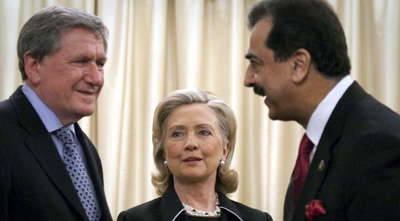Sen. Richard Lugar, ranking member of the U.S. Senate Committee on Foreign Relations, wrote to Pakistani Prime Minster Yousuf Raza Gilani on September 22 to express concern about the brutal attack on Umar Cheema. The journalist was abducted on the weekend of September 4-5 by men in black commando-style uniforms, who beat and humiliated him. It’s a case I’ve written about repeatedly (you can find links here, here, here, here, here, and here). But the prime minister has not yet responded to Lugar’s letter, which was delivered through the U.S. Embassy in Islamabad.
In its opening paragraph, Lugar’s letter to Gilani mentions the September 2009 Kerry-Lugar-Berman Enhanced Partnership with Pakistan Act, which “seeks to enhance not only Pakistan’s economy, but its democracy.” It goes on to call Cheema’s case a “bellwether” because such attacks undercut the “bedrock of democracy.”
It would be a great surprise if the criminal investigation makes any headway. It will not happen for a number of reasons. First, the police-headed Joint Investigation Team lacks the will to identify the culprits. As I told you earlier, forming the JIT was aimed at appeasing criticism in media and for the public’s consumption, so that, whenever issue is raised, the government can say that ‘an investigation is in progress.’ I doubt they will complete the probe in even a year. I had had a telephone conversation the other day with a JIT member and he said there has been no more than what I was told two months before. It’s been over a month now when I attended the JIT session and I have yet to receive the meeting’s minutes. The truth is they don’t have such a record, and this shows the level of seriousness from the top on down. If you remember, Interior Minister Rehman Malik had pledged on September 7 to complete the investigation within eight working days. Today is November 7.
As for the Judicial Commission, it may soon submit its report to the government. But the report won’t be a big help in getting to the culprits, though. It will focus on suggesting ways and means of how to avert such happenings in the future.
